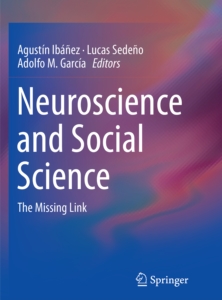Neuroscience and Social Science: The Missing Link
Springer
Ibáñez, A., Sedeño, L., & García, A. M. (eds.) (2017). Neuroscience and Social Science: The Missing Link. Nueva York: Springer. 546 páginas. ISBN: 978-3-319-68420-8. Online: http://bit.ly/2xobi6Z.
Este libro tiende puentes entre expertos internacionales neurocientíficos y de las ciencias sociales, integrando perspectivas de ambos campos, distinguiendo las divisiones reales de las falsas y delineando los nuevos desafíos para la investigación futura. Gracias a su pluralismo explicativo, las neurociencias han ido más allá de las dicotomías y reduccionismos de larga data, forjando nuevos caminos para el diálogo con disciplinas como la economía, el derecho, la educación, las políticas públicas y la sociología. Al mismo tiempo, nuevos problemas emergen en la convergencia, divergencia y controversias de estos campos. Al poner a los neurocientíficos y científicos sociales frente a frente, el libro promueve nuevas reflexiones sobre este vínculo tan necesario al tiempo que abre oportunidades para que la neurociencia social se traslade del laboratorio al centro de la vida social
Para acceder al libro, hacé click aquí.
Neuroscience and Social Science: The Missing Link
Springer
Ibáñez, A., Sedeño, L., & García, A. M. (eds.) (2017). Neuroscience and Social Science: The Missing Link. Nueva York: Springer. 546 pages. ISBN: 978-3-319-68420-8. Online: http://bit.ly/2xobi6Z.
This book seeks to build bridges between neuroscience and social science empirical researchers and theorists working around the world, integrating perspectives from both fields, separating real from spurious divides between them and delineating new challenges for future investigation. Since its inception in the early 2000s, multilevel social neuroscience has dramatically reshaped our understanding of the affective and cultural dimensions of neurocognition. Thanks to its explanatory pluralism, this field has moved beyond long standing dichotomies and reductionisms, offering a neurobiological perspective on topics classically monopolized by non-scientific traditions, such as consciousness, subjectivity, and intersubjectivity. Moreover, it has forged new paths for dialogue with disciplines which directly address societal dynamics, such as economics, law, education, public policy making and sociology. At the same time, beyond internal changes in the field of neuroscience, new problems emerge in the dialogue with other disciplines.
Neuroscience and Social Science – The Missing Link puts together contributions by experts interested in the convergences, divergences, and controversies across these fields. The volume presents empirical studies on the interplay between relevant levels of inquiry (neural, psychological, social), chapters rooted in specific scholarly traditions (neuroscience, sociology, philosophy of science, public policy making), as well as proposals of new theoretical foundations to enhance the rapprochement in question.
By putting neuroscientists and social scientists face to face, the book promotes new reflections on this much needed marriage while opening opportunities for social neuroscience to plunge from the laboratory into the core of social life. This transdisciplinary approach makes Neuroscience and Social Science – The Missing Link an important resource for students, teachers, and researchers interested in the social dimension of human mind working in different fields, such as social neuroscience, social sciences, cognitive science, psychology, behavioral science, linguistics, and philosophy.
To access the book, please click here.


